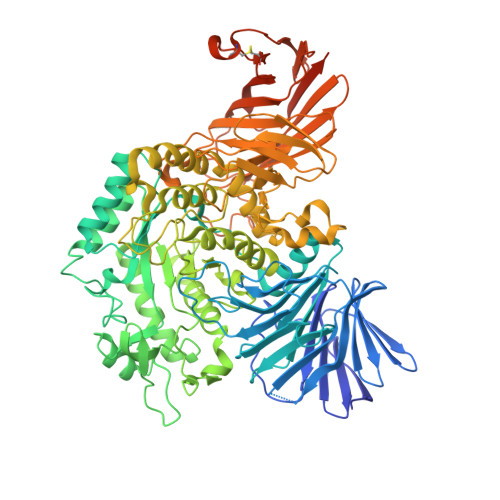1,6- epi-Cyclophellitol Cyclosulfamidate Is a Bona Fide Lysosomal alpha-Glucosidase Stabilizer for the Treatment of Pompe Disease.
Kok, K., Kuo, C.L., Katzy, R.E., Lelieveld, L.T., Wu, L., Roig-Zamboni, V., van der Marel, G.A., Codee, J.D.C., Sulzenbacher, G., Davies, G.J., Overkleeft, H.S., Aerts, J.M.F.G., Artola, M.(2022) J Am Chem Soc 144: 14819-14827
- PubMed: 35917590
- DOI: https://doi.org/10.1021/jacs.2c05666
- Primary Citation of Related Structures:
7P2Z, 7P32, 7P4C, 7P4D - PubMed Abstract:
¦Á-Glucosidase inhibitors are potential therapeutics for the treatment of diabetes, viral infections, and Pompe disease. Herein, we report a 1,6- epi -cyclophellitol cyclosulfamidate as a new class of reversible ¦Á-glucosidase inhibitors that displays enzyme inhibitory activity by virtue of its conformational mimicry of the substrate when bound in the Michaelis complex. The ¦Á-d- glc- configured cyclophellitol cyclosulfamidate 4 binds in a competitive manner the human lysosomal acid ¦Á-glucosidase (GAA), ER ¦Á-glucosidases, and, at higher concentrations, intestinal ¦Á-glucosidases, displaying an excellent selectivity over the human ¦Â-glucosidases GBA and GBA2 and glucosylceramide synthase (GCS). Cyclosulfamidate 4 stabilizes recombinant human GAA (rhGAA, alglucosidase alfa, Myozyme) in cell medium and plasma and facilitates enzyme trafficking to lysosomes. It stabilizes rhGAA more effectively than existing small-molecule chaperones and does so in vitro , in cellulo , and in vivo in zebrafish, thus representing a promising therapeutic alternative to Miglustat for Pompe disease.
Organizational Affiliation:
Department of Medical Biochemistry, Leiden Institute of Chemistry, Leiden University, Einsteinweg 55, Leiden 2333 CC, The Netherlands.




















